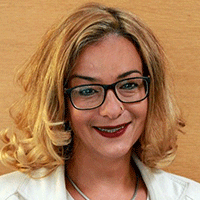Efficient Thermal Simulation Using Compact Models
Summary: Heat is generated in almost all technical processes. For example, the integration density in modern electronic systems is so high that their performance is limited by cooling. Microelectronic reliability depends on thermo-mechanical properties of packages. Highly integrated batteries of hybrid electrical vehicles depend on cooling. The properties of electrical machines are determined by the heat losses, etc. These effects can be determined by numerical simulations via e.g., finite element analysis of temperature fields. However, the key to correctly considering the entire system is a system-level simulation in which compact thermal models are connected to further mechanical, electrical or fluidic components.
Furthermore, the compact models can be used for efficient design optimization and control and can be shared along the supply chain, as they protect the IP.
Using industry-relevant examples, this seminar shows the great advantages of compact thermal models, explains the underlying theory in a comprehensive way and presents the state-of-the-art software tools and working flow.
Schedule
Part 1 : Model Order Reduction (Theory and Applications) 9h-10:30
- Functional principle and methods of model order reduction
- Reduction of a complex thermal model in ANSYS Mechanical
- Integrate the compact model in the system simulation
10:30-11 Coffee Break
Part 2 : A New Industrial Standard: Model Reduction inside ANSYS (Hands-on) 11h-12:30
- Model order reduction of thermal models in ANSYS Mechanical from the fields of electronics, automotive, microsystems
- Import compact thermal models in ANSYS Twin Builder
- System simulation and model-based design of a control for thermal processes and systems with ANSYS Twin Builder
12:30-13:30 Lunch Break
Part 3: Coupling Reduced Order Models (Theory and Hands-on) 13:30-15h
- Thermal interfaces for the approximation of the convective boundary conditions
- Thermal interfaces for the approximation of contact surfaces in complex thermal models from the field of electronics
- Model order reduction of thermal component models using thermal interfaces
- Coupling of reduced component models in ANSYS Twin Builder
15h-15:30 Coffee Break
Part 4: Advance Topics (parametric Model Order Reduction) 15:30-17h
- Functional principle of the parametric model order reduction
- Retention of the heat transfer coefficient as a parameter in the reduced model
- Boundary condition changes following the reduction of the FE model
Short Course Quick Reference Guide

INSTRUCTOR
Prof. Dr.-Ing. Tamara Bechtold
Fachbereich Ingenieurwissenschaften
Forschungsgebiet Modellierung und Simulation mechatronischer Systeme
Jade Hochschule
Tamara Bechtold obtained her PhD in microsystem simulation from the University of Freiburg, Germany, in 2005. Between 2006 and 2010, Dr.Bechtold worked as a research engineer for Philips Research Laboratories and NXP Semiconductors in Eindhoven, The Netherlands. The objective of her research work was to enhance the standard IC design flow through model order reduction and optimization modules. From 2011 to 2014 she acted as an interim Professor for microsystems simulation at the University of Freiburg, Germany and since 2014 as a lecturer and research group leader at the University of Rostock, Germany. Since 2017 Dr.Bechtold is a full professor for mechatronic systems at Jade University of applied sciences in Wilhelmshaven, Germany. Since 2022 she is a managing director of Steinbeis Transfer Center Finite Element Simulation, Model Order Reduction and Design Optimization.
Dr.Bechtold is author or co-author of over 150 technical publications in the area of modelling and simulation of micro-mechatronic systems, the lead author of the textbook "Fast Simulations of Electro-Thermal Microsystems: Efficient Dynamic Compact Models", published by Springer and the main editor of the textbook "System-Level Modeling of MEMS", by Wiley-VHC book series on Advanced Micro and Nanosystems. Her research interests cover applications of advanced mathematical methods of model order reduction and topology optimization to engineering problems and a multi-physics modelling on the device- and system-level.